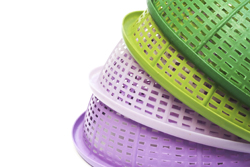Customised polymeric components at a profit
RM, also called additive manufacturing, enables faster production through a bottom-up layering approach (additive) rather than cutting components from a large piece or requiring moulds for shaping. In addition, there is less materials waste and programmes can automatically generate machine process parameters via computer-aided design, all of which increase speed, decrease costs and enhance flexibility. A current drawback in the production of polymeric components is the lack of polymers suited to conventional processing techniques. The EU-funded project 'Step up in polymer based RM processes' (STEPUP) sought to bring RM technology to its maturity for selective laser sintering (SLS) of polymers through the development of novel polymeric materials. SLS is a RM technique that uses a laser beam to selectively fuse powders to be processed. STEPUP developed cost-effective synthesis routes to produce nanostructural modifications to conventional polymer powders. The modifications enhanced the final mechanical and thermal properties of products while being compatible with existing SLS production equipment. In addition, decision support software and modelling tools enabled design engineers to identify the best new candidate to replace conventional materials based on predicted performance of the SLS-compatible materials. The most promising materials developed exhibited enhanced mechanical properties at elevated temperatures and facilitated good accuracy and surface quality of components. Process costs were comparable to currently available SLS powders and promising reductions in material cost due to recycling are also expected. The STEPUP project developed novel nanopolymers including synthesis methods to enable RM using existing SLS equipment. Design tools and models will help engineers choose the appropriate alternative to currently available polymers based on desired mechanical and thermal properties. Optimisation and commercialisation of concepts has the potential to significantly enhance the quality and types of customised polymeric products that can be inexpensively manufactured.







